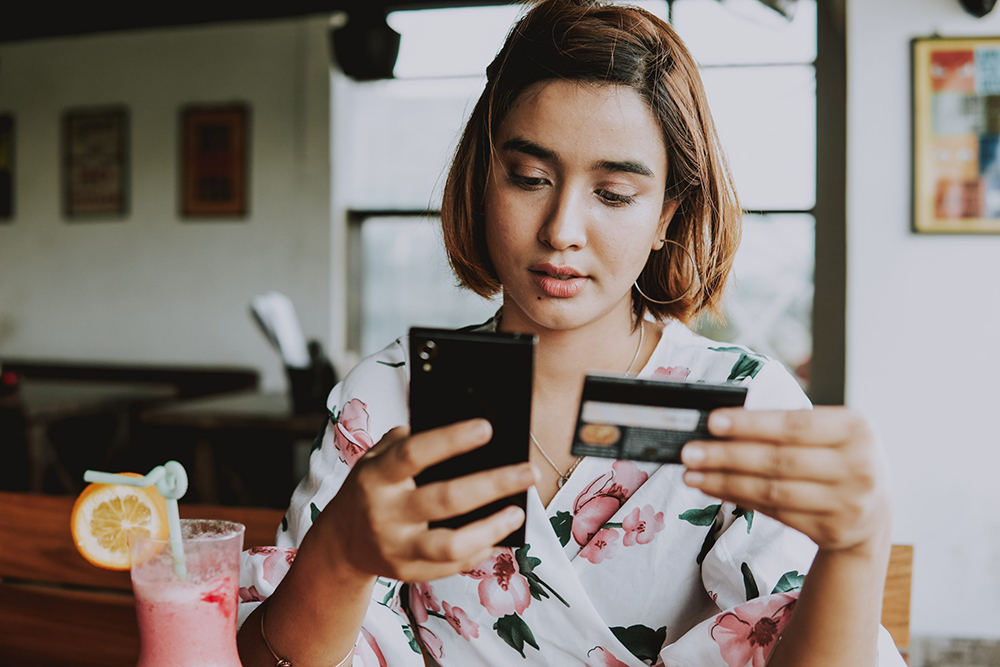
哪怕最强大(或最节俭)的人,也可能因为手机购物吃亏。可能因为在Facebook Marketplace上询问1英里范围内能不能买到椅子,也可能因为抢购某个网红戴着看起来很可爱的耳环,或者老大不小了还买史莱姆起泡胶玩具,人们总会以某种方式遭遇网络购物陷阱,其中年轻用户受影响尤为严重。
成长过程中与网络接触更多的几代人发现,自己最容易受网络购物吸引。Bankrate针对3500多人的一项新调查显示,大多数Z世代(60%)和千禧一代(61%)承认,过去一年中曾经因为社交媒体冲动购物。老一辈也很难拒绝最新广告里小工具或新奇海报的诱惑,不过他们自认为受影响较小;42%的X一代和34%的婴儿潮一代承认今年曾经在网络上冲动购物。
“年轻人尤其容易被体验左右,”Bankrate高级行业分析师泰德·罗斯曼告诉《财富》杂志。“尽管我们没追问受访者冲动购物的种类,不过我估计旅行、餐饮、音乐会门票和体育赛事等体验型商品是消费主力,”他还补充说,婚礼和派对等活动的服装和相关支出可能也会起到一定推动作用。
尽管冲动购物绝非个例,不少购物者还是会后悔一瞬间的选择。不过冲动购物最少消费也最低的人后悔的可能性反而最高:婴儿潮一代平均每年在社交媒体上冲动购物花费418美元,后悔的比例达62%。与此同时,千禧一代花费最多,为1016美元,后悔的比例最低(55%)。Z世代支出位居第二,为844美元,后悔比例略高于千禧一代(58%)。
冲动消费加重负担
这并非年轻一代第一次公开承认社交网络导致的额外经济压力。2023年德勤(Deloitte)第12次Z世代和千禧一代的年度调查显示,超过一半的Z世代和千禧一代承认,社交媒体经常鼓励购买超出承受能力的东西。与此同时有报道称人们对财务非常焦虑,也很担心当今的生活成本。
其实冲动购物可能属于年轻一代的及时行乐文化,这种文化主要因为年轻一代成长于资本主义后期和气候变化的当下,希望借此暂时摆脱对生存和财务的恐惧。与沉重的学生贷款和买房的巨大压力相比,网络上的小额购物简直不值一提——或许这也是霉运总相随的千禧一代内疚感最低的原因。
不过网络购物有时会出现更阴险的转变,影响人们的心理健康和财务状况。德勤调查发现,网购行为使Z世代和千禧一代陷入了焦虑的漩涡,去年Bankrate的另一项研究发现,商业推广社交媒体帖子刺激的冲动消费会让消费者对自身财务感觉很差。
Bankrate最新调查得出的结果也很类似,Z世代和千禧一代最可能认为社交媒体宣扬不切实际的生活方式,帖子内容是为了让某人看起来比实际更成功。各世代生人当中都超过一半承认该点,不过只有12%的受访者承认自己也要为相关行为负责任。千禧一代和Z世代在社交媒体上看到其他帖子后,对自身财务状况不满的可能性最高,并表示社交媒体对自己理财方式存在负面影响。
尽管广告可能看起来有趣又励志,但社交媒体对人们钱包的影响可没什么“点赞”或“点亮红心”之说。(财富中文网)
译者:冯丰
审校:夏林
哪怕最强大(或最节俭)的人,也可能因为手机购物吃亏。可能因为在Facebook Marketplace上询问1英里范围内能不能买到椅子,也可能因为抢购某个网红戴着看起来很可爱的耳环,或者老大不小了还买史莱姆起泡胶玩具,人们总会以某种方式遭遇网络购物陷阱,其中年轻用户受影响尤为严重。
成长过程中与网络接触更多的几代人发现,自己最容易受网络购物吸引。Bankrate针对3500多人的一项新调查显示,大多数Z世代(60%)和千禧一代(61%)承认,过去一年中曾经因为社交媒体冲动购物。老一辈也很难拒绝最新广告里小工具或新奇海报的诱惑,不过他们自认为受影响较小;42%的X一代和34%的婴儿潮一代承认今年曾经在网络上冲动购物。
“年轻人尤其容易被体验左右,”Bankrate高级行业分析师泰德·罗斯曼告诉《财富》杂志。“尽管我们没追问受访者冲动购物的种类,不过我估计旅行、餐饮、音乐会门票和体育赛事等体验型商品是消费主力,”他还补充说,婚礼和派对等活动的服装和相关支出可能也会起到一定推动作用。
尽管冲动购物绝非个例,不少购物者还是会后悔一瞬间的选择。不过冲动购物最少消费也最低的人后悔的可能性反而最高:婴儿潮一代平均每年在社交媒体上冲动购物花费418美元,后悔的比例达62%。与此同时,千禧一代花费最多,为1016美元,后悔的比例最低(55%)。Z世代支出位居第二,为844美元,后悔比例略高于千禧一代(58%)。
冲动消费加重负担
这并非年轻一代第一次公开承认社交网络导致的额外经济压力。2023年德勤(Deloitte)第12次Z世代和千禧一代的年度调查显示,超过一半的Z世代和千禧一代承认,社交媒体经常鼓励购买超出承受能力的东西。与此同时有报道称人们对财务非常焦虑,也很担心当今的生活成本。
其实冲动购物可能属于年轻一代的及时行乐文化,这种文化主要因为年轻一代成长于资本主义后期和气候变化的当下,希望借此暂时摆脱对生存和财务的恐惧。与沉重的学生贷款和买房的巨大压力相比,网络上的小额购物简直不值一提——或许这也是霉运总相随的千禧一代内疚感最低的原因。
不过网络购物有时会出现更阴险的转变,影响人们的心理健康和财务状况。德勤调查发现,网购行为使Z世代和千禧一代陷入了焦虑的漩涡,去年Bankrate的另一项研究发现,商业推广社交媒体帖子刺激的冲动消费会让消费者对自身财务感觉很差。
Bankrate最新调查得出的结果也很类似,Z世代和千禧一代最可能认为社交媒体宣扬不切实际的生活方式,帖子内容是为了让某人看起来比实际更成功。各世代生人当中都超过一半承认该点,不过只有12%的受访者承认自己也要为相关行为负责任。千禧一代和Z世代在社交媒体上看到其他帖子后,对自身财务状况不满的可能性最高,并表示社交媒体对自己理财方式存在负面影响。
尽管广告可能看起来有趣又励志,但社交媒体对人们钱包的影响可没什么“点赞”或“点亮红心”之说。(财富中文网)
译者:冯丰
审校:夏林
Shopping while scrolling has likely hit even the strongest (or most frugal) of us at one point. Whether we’re asking if every chair within a 1-mile radius on Facebook Marketplace is “still available,” snagging those earrings that looked cute on some influencer, or buying slime as an adult, the online shopping bug finds us all in some form or another—hitting younger audiences especially hard.
The generations who grew up a bit more plugged in find themselves most vulnerable to the pull of online shopping. The majority of Gen Zers (60%) and millennials (61%) admit to impulse shopping because of social media in the past year, according to a new Bankrate survey that polled more than 3,500 people. Older generations aren’t immune to the siren’s call of the latest advertised gadget or novelty poster either, but say they’re less affected by it; 42% of Gen Xers and 34% of baby boomers admitted to impulse shopping online this year.
“Young adults are especially likely to be swayed by experiences,” Bankrate senior industry analyst Ted Rossman tells Fortune. “While we didn’t specifically ask about the types of impulse purchases respondents made, I suspect experiences such as travel, dining, concert tickets, and sporting events were key contributors,” he says, adding that he suspects clothing and related-spending for events like weddings and parties also played a role.
While no one seems to be alone in their impulse purchases, many shoppers are regretting their split-second choices. But it’s those who impulse shop the least—and who spend the least—who are most likely to have buyer’s remorse: Boomers, who spend an average $418 a year on social-media impulse purchases, at 62%. Meanwhile, millennials spend the most at $1,016, but are the least regretful (55%). Gen Z spends the next highest amount—$844—but is more regretful than millennials (58%).
Impulse spending weighs everyone down
This isn’t the first time younger generations have opened up about feeling extra financial pressure from their social feeds. More than half of Gen Zers and almost as many millennials admitted that social media encourages them to buy things they can’t afford, according to Deloitte’s 12th annual 2023 Gen Z and Millennial survey. That’s despite reporting high financial anxiety and concerns about today’s cost of living.
These impulse purchases could be part of the treat culture younger generations have developed in order to starve away the existential and financial dread of growing up during late-stage capitalism and climate change. In comparison to the overwhelming burden of student loans and the daunting task of homeownership, these minor purchases can often be a drop in the bucket—perhaps that’s why the perpetually unlucky millennials feel the least guilty.
But online shopping can take a more sinister turn at times, impacting our mental health and finances. The Deloitte survey found that this financial behavior was sending Gen Z and millennials into an anxiety spiral, and a separate Bankrate study from last year found that impulse spending from a sponsored social media post made consumers feel negatively about their finances.
Bankrate’s most recent survey yielded similar results, with Gen Z and millennials most likely to feel that social media promotes unrealistic lifestyles and that posts are made to make someone look more successful than they are. It’s a sentiment that more than half of all generations acknowledged, although only 12% of respondents admit that they are responsible for the same behavior. Millennials and Gen Zers were also the most likely to feel negatively about their financial situation after seeing others’ posts on social media and to say that social media has a negative impact on the way they manage their money.
While a sponsored ad can seem fun and inspirational, there’s not much to “like” or “heart” about the way social media weighs on our wallets.






